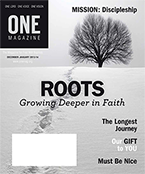
December-January 2014
Roots: Growing
Deeper in Faith
------------------
|

Called by God to Think
by Bill and Brenda Evans
F. Leroy Forlines doesn’t worry about many things these days, but the phrase, “It doesn’t matter,” does trouble him, especially when he hears it from a Christian.
To Forlines, professor emeritus of Theology at Welch College, many things matter, but none more than that Christians use our total personality—mind, heart, and will—to discover what matters to God and, therefore, should matter to us.
Mr. Forlines is author of six books, along with numerous articles and pamphlets. Currently, he is working on a book on secularism and the relationship of church and state, starting with the history of the word secularism. “That set me on fire,” he says. That fire has taken him into church-state documents, Supreme Court cases, and some surprising Jefferson and Madison documents that he won’t talk about until the book comes out. Recently, we asked him about the mind and its role in finding truth to live by.
Evans: At least one person I know says some Christians are called by God to think. Do you agree?
Forlines: That is the way it has worked out for me. My circumstances, as I look back, were preparing me. I was brought up in a strong home with Christian character. Integrity was the most important thing. My father had a third-grade education but was well-respected. He and Mother married when she was 15. She went through seventh or eighth grade but was intelligent and well read.
We were in the lower culture. Papa was two rungs up from a day worker and one rung up from a sharecropper who only got half of the crop. Papa got two-thirds because he owned his own equipment. In 1929, three years after I was born, too much rain destroyed his tobacco crop, the same year the stock market crashed. I’m 87, and I think my age is a great advantage because I was living during the Great Depression and World War II, well before the student movement of the 1960s that rejected the truth of right and wrong.
Evans: Can you pinpoint a time or event that pressed you toward a life of the mind?
Forlines: As a child, I had a very strong sense of why. Not that I ever asked Papa that, but I mulled on why, and I worried a lot. The most important thing was the law of non-contradiction: a thing cannot be both true and not true. That idea has been painfully imbedded in me since childhood.
I got out of high school at 16 and five years later came here to college [Welch]. It was 1948. Those five years between, I read Sgt. York, was a grease monkey, and did little that a moron could not have done. When I got here, I argued a lot. I think I made all my professors mad because I would forget who I was talking to.
Robert E. Picirilli was in his first year, too, and we were both in the Arminian Theology class Dr. L. C. Johnson taught. We began just talking though our theology, sorting out things. Theology came alive to me, spurred me. That may have been the most important class ever taught in shaping the theological direction of this college and our denomination’s view of Arminianism. Over the years, Dr. Picirilli and I have had many strong exchanges. You might say we became sparring buddies, but that class was where I first began to do hard-down thinking.

Evans: What is hard-down thinking?
Forlines: Something you do to work a thing out, figure out what you’re saying and thinking and what it means to you. In search of truth, it is important to know what other people write or say on a subject. You have to research, be informed, but then it gets down to what you think and why you think it. That’s hard-down thinking.
Evans: These days we read a lot about brain science. Do you differentiate between brain and mind?
Forlines: Yes, because there’s a great difference. Among the secular academically elite, only matter matters. There’s no soul, only brain. But human personality involves mind, heart, and will, not just brain and body. Without mind, heart, and will, there is no right and no wrong, so we are left to fight our way through a nihilism that has no religious or moral principles.
Evans: As a thinker, do you go into the fight with a blank slate or with preconceptions?
Forlines: I go in with my full personality, who I am as a human being. My worldview, my life view, my mind, heart, will. We have all that to draw on. Take just one part, the subconscious. It is a vast storehouse of knowledge that exists below the conscious mind that we can call up at a moment’s notice. A name, the tallest person you know, all sorts of things you’ve stored there. It can even do research while you sleep or talk or do anything else.
It is like when I was growing up, the raisins my mother cooked with did not have seeds, but the cluster raisins my father bought for Christmas did, and as a child I wondered how that was, but I didn’t ask. Years later, the boys downstairs said to me, “Seedless grapes make seedless raisins.” There was the answer.
Evans: (laughing) You call your subconscious mind “the boys downstairs”?
Forlines: Yes, my students liked that, but that is just the subconscious level. We have all sorts of things going on in our minds. For example, my mind looks for ways to bring things together.
Evans: What do you mean “bring things together”? A synthesis?
Forlines: It’s an integration. How everything fits together. Let’s say truth is spherical, like a globe. On a globe, Tennessee is small, so we take it out and put it on a flat map to try to understand it better. But then, we have to put it back on the globe to see how it fits in the bigger context or we miss the full truth of what Tennessee is. We can’t understand what we have until we see where it fits with other things. If we don’t bring things together, we come up with wrong answers.
In universities, specialization tends to lose integration, so you have fragmentation. You may be an expert on one part of a thing but an ignoramus on the whole. I don’t want a heart specialist who only studies the heart and not its function in the body as a whole. He’s got a fragmented view.
Evans: Is fragmentation part of what is wrong with the statement “It doesn’t matter”? Is it looking just at yourself and not seeing the larger context?
Forlines: It’s more than that, and I talk about it a lot in my book The Quest for Truth. For example, Truth with a capital T matters because Truth exists outside the knower and it is for living life. It is not just a cold, dry collection of abstract and impersonal ideas. The attitude that Truth doesn’t matter has destroyed our culture.
Evans: In what way?
Forlines: Morals, for example. Questions of right and wrong—honesty, purity, self-control, those kinds of things. Ideals, too, values such as dignity, honor, good manners, masculinity, femininity, and many others. Propriety is another ideal we’ve lost. I don’t hear people ask, “Is it appropriate?” anymore. Anything goes, and the Church has fallen into that. And there’s civility. Do we do anything to civilize our people or foster good taste? These have suffered under the pressure of our culture, and I’m not talking about money or where you stand on the socio-economic ladder. It doesn’t take money to be civilized. As I said, I grew up in a lower culture, but I knew those things mattered. I believe they still do.
Evans: You have spoken about your childhood several times, also that you worried and were lonely. Were you a deprived child?
Forlines: In socialization, yes. My situation was not very good. I had three older sisters and a younger brother, but I longed for some boy my age to move into our neighborhood. I was functional at school and at church, but that’s all. I lost out on other things. So when I could drive, I made up my mind that I would get involved even if I embarrassed myself. Back then, you dated on Saturday nights, so I had a date with about 38 different girls.
Evans: Just one date with 38 different girls?
Forlines: (laughter) Yes. I was shy, but I worked on it. That’s why I emphasize social relationships, friendship, how to have conversations. God designed us for relationship. That need is no less real than our need for air, water, food, and cannot be ignored without serious consequences. It is not good to be a loner. Loners are troubled people. I’ve written about that, too.
Evans: You mentioned intellectual integrity at one point in our conversation. Let’s go back to that. What do you mean by intellectual integrity?
Forlines: Let me tell you two stories. I was called to preach when I was 19. When I graduated from college the first time, Mother wrote me a letter. In it she said that the day I was born she asked the Lord to call me to preach. She had never told me that. She wanted it to be God’s call not hers, and it was.
Then some years later, while I was preaching I told a congregation that God was able, He cared for them, and if they would turn a thing over to Him and believe, He would take care of it. During the invitation, I thought, I wish I could get it to work for me like I’m telling them. That’s when I knew I could not make myself live on and on by a lie.
A preacher can’t be careless with the truth or how he delivers it. He may exegete a passage and hardly anybody be moved; so it is not just about correct information even if that information is about God. We are in a troubled culture, and I don’t think many in this culture feel they are being spoken to. Sermons are not heard or listened to.
We preachers can learn something from fiction. Fiction connects with something in you, or you wouldn’t read it. Sermons have to come alive to you as well, connect to your total personality. When something true comes through your mind and into your heart and will, you register its value, its importance to you. It becomes Truth to you. Something you can live by, and something you can die by.
About the Writers: Bill Evans, former director of the Free Will Baptist Foundation, lives in Catlettsburg, Kentucky, with his wife Brenda, a retired English teacher. Visit www.fwbgifts.org for more information about planned giving.
|
|

